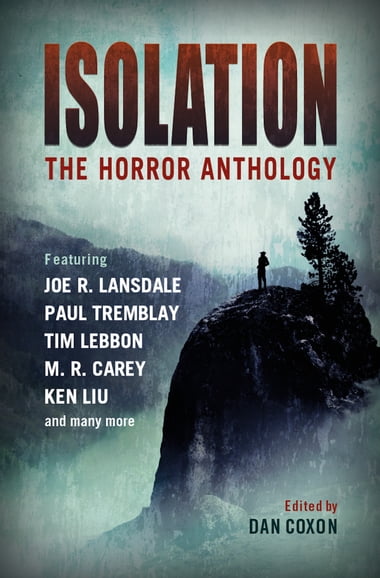This unexpected COVID-19 pandemic may have affected people differently, but the simple truth is that it hit most of us hard. Whether it was sickness, loss or the effects of isolation, it affected us all. Some thrived, but many didn’t, and it’s because we are a social creature.
In the new compilation, Isolation: The Horror Anthology, a group of authors who tell scary stories for a living have come together to share tales of isolation-driven fear. It’s a timely release and subject, which was inspired by the COVID-19 pandemic, although some of the collected stories were written years prior. A number of them are brand new, though, and I don’t think I’d read any of them before.
If you’ve read my past reviews, you’ll perhaps know that I’m a sucker for collections of short stories; especially when they’re from the horror genre. I love the variety, and not knowing what to expect once you finish one and go to start another. In fact, two of my favourite books are short story collections, with those being 20th Century Ghosts and Full Throttle by Joe Hill.
Side note: In case you’re interested in checking them out, please note that 20th Century Ghosts was recently re-released and renamed ‘The Black Phone,’ in order to tie into the new movie starring Ethan Hawke. It’s based on one of the stories from within.
Isolation: The Horror Anthology was edited by Dan Coxon. It presents a themed assortment of twenty different short stories, which average around 20 pages in length. These tales were written by some of horror’s most well known and revered modern authors, as well as others whom I hadn’t heard of before. The list includes Nina Allan, Laird Barron, Ramsey Campbell, M.R. Carey, Brian Evenson, Owl Goingback, Joe R. Lansdale, Tim Lebbon, Jonathan Maberry, Marian Womack and Paul Tremblay.
Although it goes without saying, I’ll say it anyway: These stories vary in quality, and some are obviously better than others. That said, it’s all subjective. The stories I liked most may not be the ones you’ll enjoy most. There are no bad tales to be found within, though, which is impressive. There were a couple that I didn’t enjoy all that much, but I respected them and understood I maybe wasn’t the right audience for them. After all, horror varies wildly as a genre, and has lots of different sub genres.
The included pieces ran the gamut of ways in which one could feel isolated, both physically and mentally. Their characters travelled to distant and remote locations, dealt with the loss of loved ones, struggled with a fear of the unknown and wondered if they were the last ones alive. There are some triggers within as well, such as death, grief and abuse.
Some of my favourite stories from Isolation included one about people trying to get by in an apocalyptic world, the story of a dead man living his second wind, a tale about a cleaning lady with sticky fingers and one about a young man who goes out in search of friends. Meanwhile, I didn’t really enjoy Ken Liu’s piece about post-pandemic travel protests and the creation of jaunts, which allow people to travel using robots, virtual reality controls and cameras, because it read like an article in a tech journal. I found it boring, and forced myself to read it all. Additionally, Laird Barron’s ‘So Easy to Kill’ — a story about futuristic humans placing their awareness into robots sent out to colonize other planets, or something like that — was both hard to understand and mostly tedious to read. I didn’t really know what was going and, once again, had to force myself to continue reading it.
While I can’t say that I found any of these stories to be truly great, I enjoyed reading almost all of them and liked Isolation: The Horror Anthology overall. It’s a good, timely, collection of short fiction, and one that fans of the genre should enjoy.
This review is based on an early copy of the book that we were provided with.

